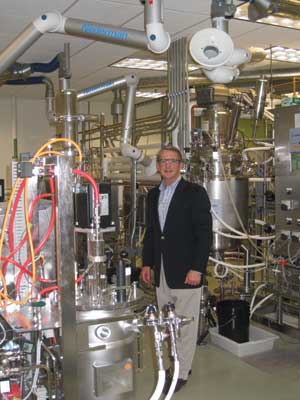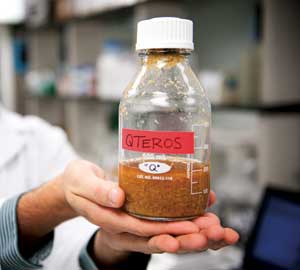Not Satisfied with the Status Q




May 21, 2010
BY Holly Jessen
In the past 20 years, John McCarthy Jr. has used a self-described passion for science to leverage funding for scientific companies. More recently, he's turned his attention specifically to alternative energy companies. "I love bringing together great scientists with great business people," he tells EPM.
That's exactly why Massachusetts -based Qteros brought him on as president and CEO. The industry veteran spoke with EPM shortly after he took the helm at Qteros, which is perfecting its trademarked and patented Q Microbe for converting cellulosic biomass directly into ethanol in a single step.
Qteros' announcement of McCarthy's new position with the company, crowed about its new leader's history of managing "transformational growth" and raising more than $1 billion in capital for various life science and bio-based chemical companies.
Board member and investor Jason Matlof of Battery Ventures agreed. "John's proven leadership commercializing technologies in the biotech and biofuels industries is a perfect fit with Qteros as we move from the R&D stage and into development," he tells EPM. "We are thrilled to have John on board."
Thrilled indeed. McCarthy is perhaps best known in biofuels circles for helping broker a $90 million strategic partnership between multinational oil company BP plc and Verenium Corp., a Cambridge-based cellulosic ethanol firm, that was announced in 2008. BP's investment wasn't the only source of funding to help further Verenium's research. When McCarthy started working there, it was a small, privately held company, and when he left it was a publically traded company.
Steve Goldby, Qteros board member and partner at Venrock Associates, recognized that experience in a statement when Qteros announced its new CEO. "John's experience building pioneering companies in the biofuels industry such as Verenium, together with his proven track record of developing and managing complex strategic corporate partnerships make him uniquely qualified to lead and position Qteros for significant growth," he says.
Lessons to Learn
So what's McCarthy's view on bringing Big Oil or Big Industry to the biofuels investment table? It's a must do for both sides, he says. Smaller scale companies just don't have the reach and breadth to get where they want to go alone. To advance their technology, they need partners and investors with big scale experience and balance sheets, such as BP provides for Verenium. "That's the size of the organizations that are going to make a difference," he says.
Looking back at the precedent-setting deal between BP and Verenium, McCarthy recalls everything happening rather quickly. He joined the company in early 2007, about the time of the merger of Celunol and Diversa to form Verenium. By the end of a year and a half, BP and Verenium were strategic partners. At the time, for Verenium, it might have felt like the process was going slowly, he acknowledges, but not so for BP. "For them, they were moving at light speed," he says.
But it's not a one-way street benefiting only biofuels. In McCarthy's view, it's clear biofuels have never threatened Big Oil. Even the combined total ethanol production of the United States and Brazil is only a drop in the bucket for any one of the major petroleum players. However, those companies can no longer afford to ignore the industry either, McCarthy says.
Take oil giant Exxon Mobil Corp. It wasn't long ago that its CEO went on record as saying the company had no plans to get involved in alternative fuels. Then, last summer, Exxon made a $600 million investment into algae-based biofuels.
The investment was significant for the energy research at Synthetic Genomics Inc., for sure. For Exxon, on the other hand, that $600 million didn't mean much in hard numbers. "Directionally and meaningfully," however, it was a huge step for the oil company. "Exxon cannot not be in this business," McCarthy says.
Bird's-Eye View
Before joining Qteros, McCarthy was chief business officer of Microbia. His resume includes senior executive positions at Xanthus Pharmaceuticals, Synta Pharmaceuticals, Exact Sciences, Concentra Managed Care and Morgan Stanley. Graduating with high honors from Lehigh University, McCarthy received a master's degree in business administration from the Harvard Business School, but it wasn't until four or five years ago that he started concentrating on the alternative energy space. "I wish I could tell you that back in high school or college, I had a perfect crystal ball," he says.
In recent years, McCarthy, along with the rest of the industry, has watched large industrial agricultural and fuel companies step into the alternative fuels marketplace in a very real way. Especially during his time at Verenium, he's had a "bird's-eye view" of just how rapidly the industry could evolve. In working on the deal for Verenium, McCarthy talked to almost every major oil company, getting a good sense of where those companies stand on biofuels. He has, in fact, a lot of respect for many of those companies, specifically BP.
So how did he get from there to here? When Qteros approached McCarthy about leading that company, there were two things that attracted him. One was the list of investors already on board including Venrock Associates, Battery Ventures, Soros Fund Management LLC and Valero Energy Corp. BP is also an investor, though it's through BP Technology Ventures, not the same arm of BP that is a strategic partner of Verenium. Qteros has a group of solid investors from broad areas of interest. "That collection of investors … is extremely important to me," McCarthy says.
The other reason he took the job was the science. Qteros has a unique organism and technology platform. That's power he can recognize. "All of that wrapped to what I thought was a really compelling opportunity," he says.
Qteros had its start in 1996 when University of Massachusetts microbiologist Susan Leschine and her lab assistant, Tom Warnick, found a microbe to break down plant waste. After gathering samples all over the world, the super bug they found was in their backyard at the Quabbin Reservoir in western Massachusetts. Ten years later, Leschine and others formed SunEthanol, a name later changed to Qteros in recognition of its beginning at Quabbin.
The difference between Verenium and Qteros, besides $90 million from Big Oil, is their business models. Verenium's focus is producing clean ethanol. The company has built pilot and demonstration plants and is working toward commercial-scale production. Qteros, McCarthy says, is looking for partners that want to use its technology and organism to produce ethanol. To use a computer analogy, Verenium is targeting the hardware, while Qteros is focusing on the software, although both have developed conversion technologies.
Asked if he planned to take Qteros public, like Verenium, McCarthy didn't say yes or no. At this point, he says, there's no reason the company should or shouldn't be publically traded. If, at a later date, it makes sense to take it public, that's what they'll do. Going public, McCarthy says, is simply another finance tool. And, it's a tool he's clearly comfortable wielding, having taken three companies public and managed four publicly traded companies.
Either way, Qteros offers current and potential investors significant value. McCarthy believes that some of the major players could very well find a good partner in the company. "I'd like to think that there are opportunities for that," he says.
Over the short term, his plans are to hit the Qteros accelerator as rapidly as possible. That means both in the research lab and in discussions with possible partnerships.
McCarthy says he feels confident about the cellulosic industry as a whole, too. Ethanol production has gone through some "gut-wrenching changes," from Midwest farmers with the know-how to produce ethanol from corn, to more complex second generation ethanol developments. It was a rapid learning curve that evolved naturally, he says.
Corn-based ethanol has been under the spotlight lately, as smaller companies became larger. Some companies went public, only to go bankrupt and then get bought up by other, larger companies, at barrel-bottom prices. "Frankly some of them blew up because they couldn't manage the growth," he says.
Now, cellulosic ethanol is on the path of growth as the future unfolds. The cellulosic ethanol industry is a lot closer now to full-scale commercialism than it was, even two years ago. "I'm excited about where the industry is today," he says, adding that he's talking about both the U.S. industry and worldwide. "I can't think of a better place to be." EP
Holly Jessen is associate editor of Ethanol Producer Magazine. Reach her at (701) 738-4946 or hjessen@bbiinternational.com.
That's exactly why Massachusetts -based Qteros brought him on as president and CEO. The industry veteran spoke with EPM shortly after he took the helm at Qteros, which is perfecting its trademarked and patented Q Microbe for converting cellulosic biomass directly into ethanol in a single step.
Qteros' announcement of McCarthy's new position with the company, crowed about its new leader's history of managing "transformational growth" and raising more than $1 billion in capital for various life science and bio-based chemical companies.
Board member and investor Jason Matlof of Battery Ventures agreed. "John's proven leadership commercializing technologies in the biotech and biofuels industries is a perfect fit with Qteros as we move from the R&D stage and into development," he tells EPM. "We are thrilled to have John on board."
Thrilled indeed. McCarthy is perhaps best known in biofuels circles for helping broker a $90 million strategic partnership between multinational oil company BP plc and Verenium Corp., a Cambridge-based cellulosic ethanol firm, that was announced in 2008. BP's investment wasn't the only source of funding to help further Verenium's research. When McCarthy started working there, it was a small, privately held company, and when he left it was a publically traded company.
Steve Goldby, Qteros board member and partner at Venrock Associates, recognized that experience in a statement when Qteros announced its new CEO. "John's experience building pioneering companies in the biofuels industry such as Verenium, together with his proven track record of developing and managing complex strategic corporate partnerships make him uniquely qualified to lead and position Qteros for significant growth," he says.
Lessons to Learn
So what's McCarthy's view on bringing Big Oil or Big Industry to the biofuels investment table? It's a must do for both sides, he says. Smaller scale companies just don't have the reach and breadth to get where they want to go alone. To advance their technology, they need partners and investors with big scale experience and balance sheets, such as BP provides for Verenium. "That's the size of the organizations that are going to make a difference," he says.
Looking back at the precedent-setting deal between BP and Verenium, McCarthy recalls everything happening rather quickly. He joined the company in early 2007, about the time of the merger of Celunol and Diversa to form Verenium. By the end of a year and a half, BP and Verenium were strategic partners. At the time, for Verenium, it might have felt like the process was going slowly, he acknowledges, but not so for BP. "For them, they were moving at light speed," he says.
But it's not a one-way street benefiting only biofuels. In McCarthy's view, it's clear biofuels have never threatened Big Oil. Even the combined total ethanol production of the United States and Brazil is only a drop in the bucket for any one of the major petroleum players. However, those companies can no longer afford to ignore the industry either, McCarthy says.
Take oil giant Exxon Mobil Corp. It wasn't long ago that its CEO went on record as saying the company had no plans to get involved in alternative fuels. Then, last summer, Exxon made a $600 million investment into algae-based biofuels.
The investment was significant for the energy research at Synthetic Genomics Inc., for sure. For Exxon, on the other hand, that $600 million didn't mean much in hard numbers. "Directionally and meaningfully," however, it was a huge step for the oil company. "Exxon cannot not be in this business," McCarthy says.
Bird's-Eye View
Before joining Qteros, McCarthy was chief business officer of Microbia. His resume includes senior executive positions at Xanthus Pharmaceuticals, Synta Pharmaceuticals, Exact Sciences, Concentra Managed Care and Morgan Stanley. Graduating with high honors from Lehigh University, McCarthy received a master's degree in business administration from the Harvard Business School, but it wasn't until four or five years ago that he started concentrating on the alternative energy space. "I wish I could tell you that back in high school or college, I had a perfect crystal ball," he says.
In recent years, McCarthy, along with the rest of the industry, has watched large industrial agricultural and fuel companies step into the alternative fuels marketplace in a very real way. Especially during his time at Verenium, he's had a "bird's-eye view" of just how rapidly the industry could evolve. In working on the deal for Verenium, McCarthy talked to almost every major oil company, getting a good sense of where those companies stand on biofuels. He has, in fact, a lot of respect for many of those companies, specifically BP.
So how did he get from there to here? When Qteros approached McCarthy about leading that company, there were two things that attracted him. One was the list of investors already on board including Venrock Associates, Battery Ventures, Soros Fund Management LLC and Valero Energy Corp. BP is also an investor, though it's through BP Technology Ventures, not the same arm of BP that is a strategic partner of Verenium. Qteros has a group of solid investors from broad areas of interest. "That collection of investors … is extremely important to me," McCarthy says.
The other reason he took the job was the science. Qteros has a unique organism and technology platform. That's power he can recognize. "All of that wrapped to what I thought was a really compelling opportunity," he says.
Qteros had its start in 1996 when University of Massachusetts microbiologist Susan Leschine and her lab assistant, Tom Warnick, found a microbe to break down plant waste. After gathering samples all over the world, the super bug they found was in their backyard at the Quabbin Reservoir in western Massachusetts. Ten years later, Leschine and others formed SunEthanol, a name later changed to Qteros in recognition of its beginning at Quabbin.
The difference between Verenium and Qteros, besides $90 million from Big Oil, is their business models. Verenium's focus is producing clean ethanol. The company has built pilot and demonstration plants and is working toward commercial-scale production. Qteros, McCarthy says, is looking for partners that want to use its technology and organism to produce ethanol. To use a computer analogy, Verenium is targeting the hardware, while Qteros is focusing on the software, although both have developed conversion technologies.
Asked if he planned to take Qteros public, like Verenium, McCarthy didn't say yes or no. At this point, he says, there's no reason the company should or shouldn't be publically traded. If, at a later date, it makes sense to take it public, that's what they'll do. Going public, McCarthy says, is simply another finance tool. And, it's a tool he's clearly comfortable wielding, having taken three companies public and managed four publicly traded companies.
Either way, Qteros offers current and potential investors significant value. McCarthy believes that some of the major players could very well find a good partner in the company. "I'd like to think that there are opportunities for that," he says.
Over the short term, his plans are to hit the Qteros accelerator as rapidly as possible. That means both in the research lab and in discussions with possible partnerships.
McCarthy says he feels confident about the cellulosic industry as a whole, too. Ethanol production has gone through some "gut-wrenching changes," from Midwest farmers with the know-how to produce ethanol from corn, to more complex second generation ethanol developments. It was a rapid learning curve that evolved naturally, he says.
Corn-based ethanol has been under the spotlight lately, as smaller companies became larger. Some companies went public, only to go bankrupt and then get bought up by other, larger companies, at barrel-bottom prices. "Frankly some of them blew up because they couldn't manage the growth," he says.
Now, cellulosic ethanol is on the path of growth as the future unfolds. The cellulosic ethanol industry is a lot closer now to full-scale commercialism than it was, even two years ago. "I'm excited about where the industry is today," he says, adding that he's talking about both the U.S. industry and worldwide. "I can't think of a better place to be." EP
Holly Jessen is associate editor of Ethanol Producer Magazine. Reach her at (701) 738-4946 or hjessen@bbiinternational.com.
Advertisement
Advertisement
Upcoming Events





